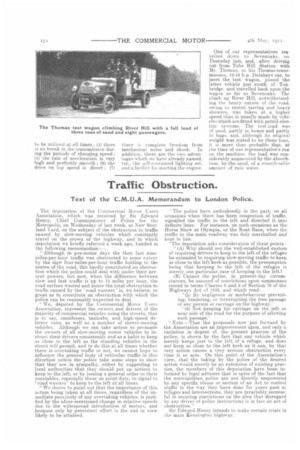Traffic Obstruction.
Page 4

If you've noticed an error in this article please click here to report it so we can fix it.
Text of the C.M.U.A. Memorandum to London Police.
The deputation of the Commercial Motor Users Association, which was received by Sir Edward Henry, Chief Commissioner of Police for the Metropolis, on Wednesday of last week, at New Scotland lard, on the subject of the obstruction to traffic caused by slow-moving vehicles which constantly travel on the crown of the highway, and to which deputation we briefly referred a week ago, handed in the following memorandum :- "Although in pre-motor days the then fast ninemiles-per-hour traffic was obstructed to some extent by the slow four-miles-per-hour traffic holding to the centre of the road, this hardly constituted an obstruction which the police could deal with under their present powers, but now, when the difference between slow and fast traffic is up to 15 miles per hour, the road surface wasted and hence the total obstruction to traffic caused by the road wasters' is, we believe, so great as to constitute an obstruction with which the police can be reasonably expected to deal.
"We, deputed by the Commercial Motor Users Association, represent the owners and drivers of the majority of commercial vehicles using the streets, that. is to say, omnibuses, taxicabs, and high-speed delivery vans, as well as a number of slower-moving vehicles. Although we can take action to persuade the owners of all slow-moving motor vehicles to instruct their drivers consistently and as a habit to keep as close to the left as the standing vehicles in the street will permit, and to do this at all times whether there is overtaking traffic or not, we cannot hope to influence the general body of vehicular traffic in this direction unless the police take some steps to show that they are in sympathy, either by suggesting to local authorities that they should put up notices to keep to the left, or by issuing a general order to their constables, especially those on point duty, to signal to ' road wasters' to keep to the left at all times.
"We desire to point out that the importance of this action being taken at all times, regardless of the immediate proximity of any overtaking vehicles, is justified by the afore-mentioned change in relative speeds due to the widespread introduction of motors, and because only by persistent. effort is the end in view likely to be attained. "The police have undoubtedly in the past, on all occasions when there has been congestion of traffic, signalled the traffic to the left and directed it into definite lines. For instance, on such occasions as the Horse Show at Olympia, or the Boat Race, when the traffic in the main roadway was duly marshalled and kept in line.
The deputation asks consideration of these points : "(A) Why should not the well-established custom of requiring drivers to keep to the left of the refuges be extended to requiring slow-moving traffic to keep as close to the left kerb as possible, the presumption being that keeping to the left of the refuges is merely one particular case of keeping to the left?
(B) Cannot the police, in present-day circumstances, be assured of convictions upon summonses issued in terms Clauses 5 and 6 of Section 78 of the Highways Act of 1815, and which read:
'(5) By negligence or misbehaviour preventing, hindering, or interrupting the free passage of any person or carriage on the highway.'
(6) Not keeping his carriage on the left or near side of the road for the purpose of allowing such passage.' "Note.—That the proposals now put forward by the Association are an improvement upon, and only a variation in degree of, the present practice of the police, is shown by the fact that any vehicle which merely keeps just to the left of a refuge, and does not keep as close to the left kerb as it can, by that very action causes a very serious obstruction every time it so acts. On this point of the Association's view, that the taking by the police of the desired action would merely be an extension of existing practice, the members of this deputation have been informed by legal advisers that in spite of the fact that the metropolitan police are not directly empowered by any specific clause or section of an Act to control traffic in the way they have done for years past at refuges and intersections, they are invariably successful in securing convictions on the plea that 'disregard by any driver of police instructions is in fact. an act of obstruction."
Sir Edward Henry intends to make certain trials in the main Kensington highway.




















